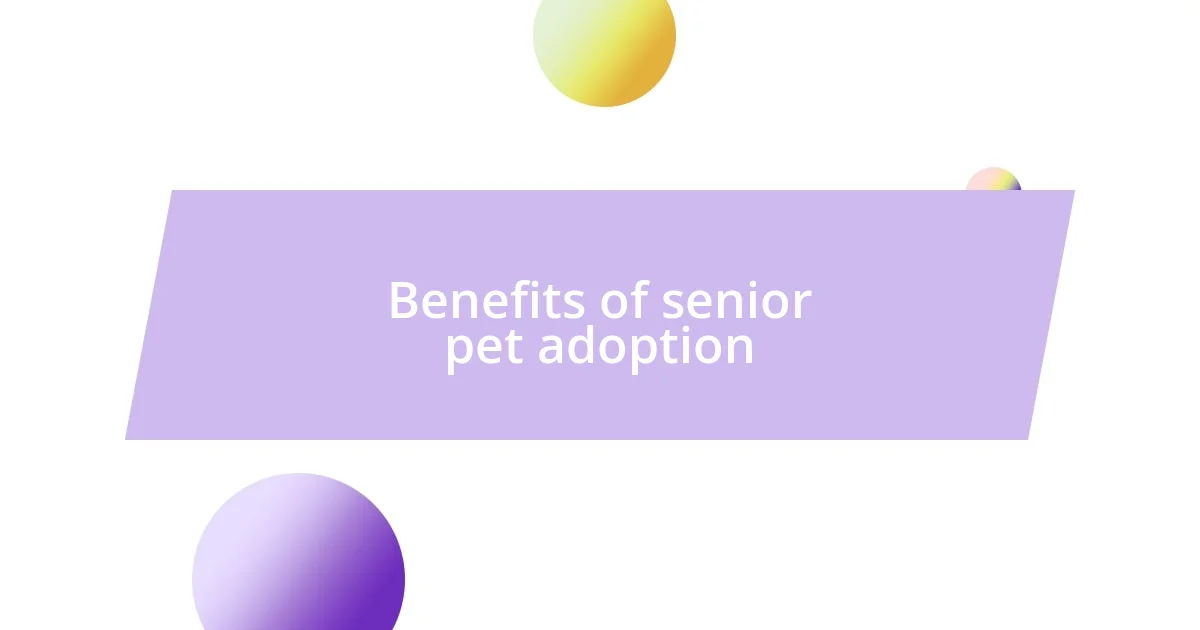Key takeaways:
- Adopting senior pets can lead to deep emotional bonds, as they often exhibit gratitude and have calmer temperaments compared to younger animals.
- Common misconceptions about senior pets, such as automatic health issues or decreased playfulness, can prevent potential adopters from considering them.
- Proper care for senior pets involves tailored nutrition, regular vet check-ups, and adjustments to their living environment to enhance their comfort and quality of life.

Reasons to adopt senior pets
One of the most compelling reasons to adopt senior pets is the undeniable love and gratitude they often exude. I remember the day I brought home a 10-year-old beagle named Max; his tail wagged as if he understood that he was finally safe. Isn’t it heartwarming to think about giving a loving home to a creature that may have experienced loneliness?
Senior pets typically have calmer temperaments compared to their younger counterparts. When I think back to my time with Lucy, a sweet golden retriever around ten years old, I recall how she enjoyed lazy afternoons on the couch—her soft presence felt like a warm hug. Wouldn’t you appreciate a pet that doesn’t require the exhausting energy of a lively puppy?
Moreover, adopting a senior pet often means you’re saving a life; many older animals are overlooked in shelters simply because of their age. When I visited the local shelter, the gaze of an elderly cat named Whiskers struck me deeply—there was a spark in her eyes longing for companionship. Isn’t it fulfilling to provide that second chance to a deserving soul?

Benefits of senior pet adoption
Adopting senior pets comes with numerous benefits that are both heartwarming and practical. For instance, older animals often have established manners and a level of training that makes them easier to integrate into a home. I recall adopting Bella, a 12-year-old tabby, whose calm demeanor and litter box training made her a breeze to care for. Don’t you find it refreshing to skip the chaos of puppy training?
Another significant advantage is the emotional connection that tends to blossom quickly with senior pets. I remember how, within days of bringing home a 9-year-old dachshund named Sparky, he curled up next to me, just soaking in affection. There’s something incredibly rewarding about being a source of comfort for a pet that has seen tougher times, don’t you agree?
Lastly, adopting a senior pet can be a more sustainable choice. Many older pets are already spayed or neutered, which means less immediate vet work for you. Plus, they usually come with a lower adoption fee. When I adopted my sweet old lab, Buddy, the fee was a fraction of what I would have paid for a puppy. Investing in a senior pet often translates to both emotional fulfillment and financial sense!
| Benefit | Description |
|---|---|
| Calm Temperament | Senior pets usually have more relaxed dispositions, making them great companions for quiet households. |
| Established Training | They often come with basic training and better manners, easing the transition into a new home. |
| Emotional Bonding | Older pets tend to form quick, deep emotional connections with their new owners. |
| Lower Cost | Adopting seniors often comes with reduced adoption fees and fewer initial vet expenses. |

Common misconceptions about senior pets
It’s easy to hold onto misconceptions about senior pets. Many people think that older animals are more likely to have health issues or behavioral problems, but in my experience, this isn’t always the case. I remember when I adopted a 12-year-old terrier named Daisy. She had been written off by many as “too old,” yet I found her to be full of life, always eager for our daily walks. It’s a reminder that age doesn’t truly define a pet’s spirit.
Here are some common misconceptions surrounding senior pets:
-
Blame It on Age: Some folks assume senior pets automatically require constant medical attention. While older animals may face health challenges, regular veterinary check-ups can keep many issues manageable.
-
Shorter Lifespan: There’s a belief that senior pets won’t be around long, leading to hesitation in adoption. I found that every moment with older pets is precious; their love can fill the time you do have together beautifully.
-
Less Playful: The idea that older pets are inactive is another myth I’ve encountered. My friend adopted a senior lab who still loved to chase after balls, just at a slightly more leisurely pace than younger dogs.
-
Harder to Train: While some think senior pets are set in their ways, I’ve witnessed a lot of them adapting quickly to new commands and routines, eager to please their new families.
Challenging these misconceptions can lead to companionships that are incredibly rewarding.

Care needs of senior pets
Caring for senior pets definitely requires some extra attention, but it’s often incredibly rewarding. I remember when my old cat, Whiskers, started showing signs of arthritis. I had to adapt some of our routines—like providing softer bedding and utilizing ramps for easier access to her favorite sunny spots. Isn’t it so satisfying when you see them more comfortable after making these adjustments?
Nutrition is another vital component when it comes to caring for older animals. I’ve found that switching to a diet specifically formulated for senior pets can make a significant difference in their energy levels and overall health. For example, I remember my golden retriever, Max, thriving after we shifted to a low-fat, joint-support formula. It’s fascinating how a few changes in diet can lead to a noticeable improvement in their quality of life, don’t you think?
Regular vet check-ups become even more crucial as pets age. I learned this the hard way with Bella. It was a routine visit that led to the discovery of her thyroid issue. Monitoring her health allowed us to manage it effectively so she could enjoy her golden years. This experience taught me how important it is for all senior pet owners to be proactive. It’s all about keeping their tail wagging for as long as possible!

Choosing the right senior pet
When choosing the right senior pet, I believe it’s essential to consider their individual personality and energy level, much like you would when selecting any companion. For instance, I once met a timid older beagle at a shelter who seemed to prefer cozy naptimes over rambunctious playdates. This didn’t diminish her charm; instead, it sparked a warmth in me that I couldn’t resist. Have you ever felt an instant connection while looking into an animal’s eyes?
It’s equally important to assess the pet’s health needs before making a commitment. I adopted an older cat who had mild kidney issues but was still incredibly affectionate. By understanding what specific care she required upfront, I was able to ensure she received the right nutrition and regular vet visits. Wouldn’t it be rewarding to give a pet the specialized care they need while forming a deep bond?
Lastly, don’t underestimate the power of temperament compatibility. My elderly dog, Charlie, was the calmest companion during family gatherings. He brought a sense of peace that I never expected from a pet. Think about how a senior pet’s demeanor could complement your lifestyle and family dynamics; it might lead to a beautifully harmonious relationship. Wouldn’t you agree that such peaceful companionship is worth considering?














